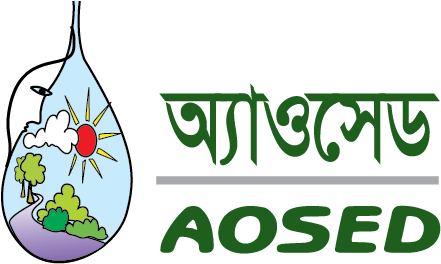Grassroots Initiatives to solve Safe Water Crisis in Dacope Upazila of Southwest Coastal Region of Bangladesh
Dacope Upazila, situated in the Southwest Coastal Region of Bangladesh, faced a severe safe water crisis exacerbated by environmental degradation and climate change impacts. With the rich biodiversity of the region, adverse effects such as increased salinity, river erosion, and obstruction of natural water flows had rendered traditional water sources contaminated with toxic metals and chemicals. This situation not only endangered the lives and livelihoods of the local populace but also posed significant challenges to the ecological balance of the area. The unavailability of potable water from shallow tube-wells further exacerbated the crisis, leaving thousands of households vulnerable to waterborne diseases and environmental hazards.
The project, spearheaded by AOSED in collaboration with SIMAVI, Netherlands, aimed to ensure the right to safe water for all residents of Dacope Upazila through grassroots initiatives. By identifying local resources and promoting their sustainable conservation and distribution, the project sought to mitigate the safe water crisis through participatory processes. Key activities included developing a comprehensive database on the safe water scenario, forming Water Rights Committees (PAC), capacity building for grassroots initiatives, and promoting hardware support for water infrastructure. Additionally, the project focused on raising awareness through media campaigns and advocacy efforts while mobilizing local resources for sustainable water management.
The project yielded significant positive outcomes, including the organization of communities through Water Rights Committees at various levels, enhancing their capacity for social mobilization, advocacy, and local resource mobilization. A participatory management system for water points was developed, reducing the workload for water collection by households. Furthermore, political consensus was achieved on the safe water issue, leading to legal actions against leasing out and illegal occupation of water bodies. Commercial shrimp farming in saline water was notably reduced, and relevant government agencies became more sensitized to addressing the safe water issue. The success of the project justified its expansion into a wider coastal region, indicating its effectiveness in addressing the critical safe water crisis in Bangladesh's coastal areas.




